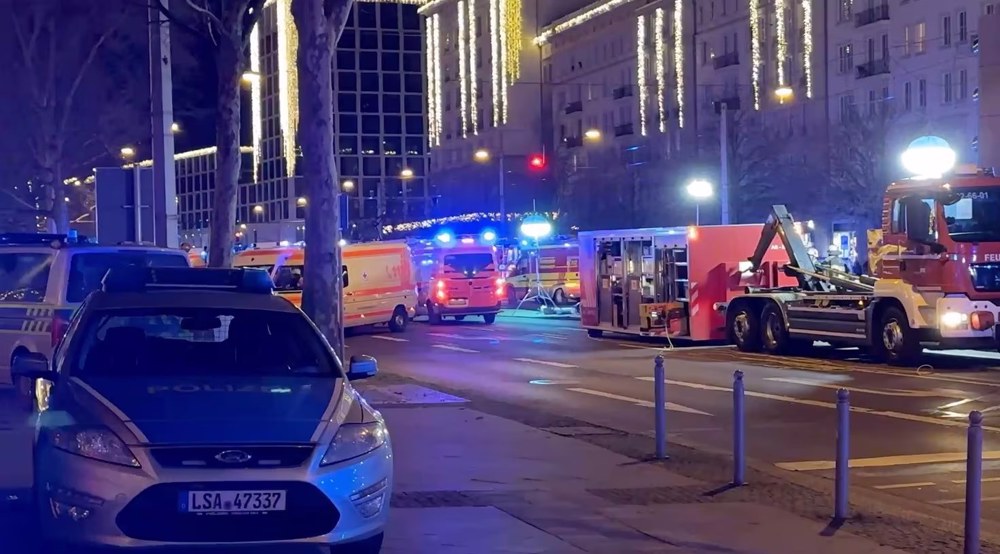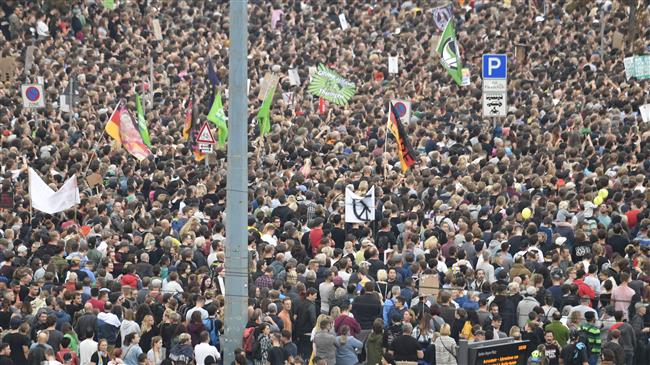Germans rally against far-right, neo-Nazi politics
More than a thousand people in the German city of Hamburg have held a Halloween-themed protest rally against far-right and neo-Nazi politics.
The demonstration, under the motto of “Antifascist Halloween,” was staged on Wednesday in an attempt to raise awareness about the alarming popularity of right-wing groups, including the anti-refugee Alternative for Germany (AfD) party.
The protesters lit fireworks and marched through the streets of Altona, the westernmost urban borough of Hamburg, with Halloween decorations of ghosts and pumpkins, in an attempt to warn Germans about the specter of far-right movements.
Back in February 2015, the AfD managed to win over six percent of the votes in the Hamburg state elections, gaining the mandate for eight seats in the Hamburg Parliament.
Meanwhile, hundreds of protesters took to the streets of the southwestern city of Freiburg as the AfD held a meeting in the city’s northernmost suburb.
According to a survey conducted in September by political research company Infratest dimap, support for AfD had reached an all-time high, with more respondents saying they would rather vote for the right-wing party than the center-left Social Democratic Party (SPD), which co-governs the country.
In early September, an estimated 150,000 people held a massive rally in the German capital, Berlin, to express their unity against racism, discrimination and far-right sentiments, after a series of xenophobic incidents in the east of the country caused growing concerns.
The demonstrators shouted anti-Nazi slogans and carried placards, banners, and signs in favor of rescue missions for refugees on the Mediterranean Sea, while chanting “More love, less hate” and “No room for Nazis.”
At the end of August, a far-right demonstration in the eastern German city of Chemnitz was held following the murder of a German national that was blamed on a refugee. The incident degenerated into attacks on foreigners, triggering the fear of rising anti-refugee sentiments.
German Chancellor Angela Merkel’s 2015 move to allow in over a million refugees — from Syria, Iraq, and Afghanistan — set off a rise in nationalist, anti-immigrant sentiments in Germany as well as in some neighboring counties, including Austria and Italy, where so-called anti-establishment, far-right parties are now in power.
Israeli strikes on north Gaza hospital ‘extremely dangerous, terrifying’: Director
VIDEO | Yemen targets Tel Aviv with Palestine 2 missiles
Pezeshkian: Iran resolved to complete North-South Transport Corridor
VIDEO | Iran-Syria: For Resistance
Qassam Brigades claims killing 3 Israeli troops in northern Gaza
More alive than ever: Sayyed Hassan Nasrallah's legacy grows stronger in martyrdom
Occupation of Syria’s highest peak Mount Hermon part of ‘Greater Israel’ project
Iran: Syrian people will decide their future without foreign interference











 This makes it easy to access the Press TV website
This makes it easy to access the Press TV website